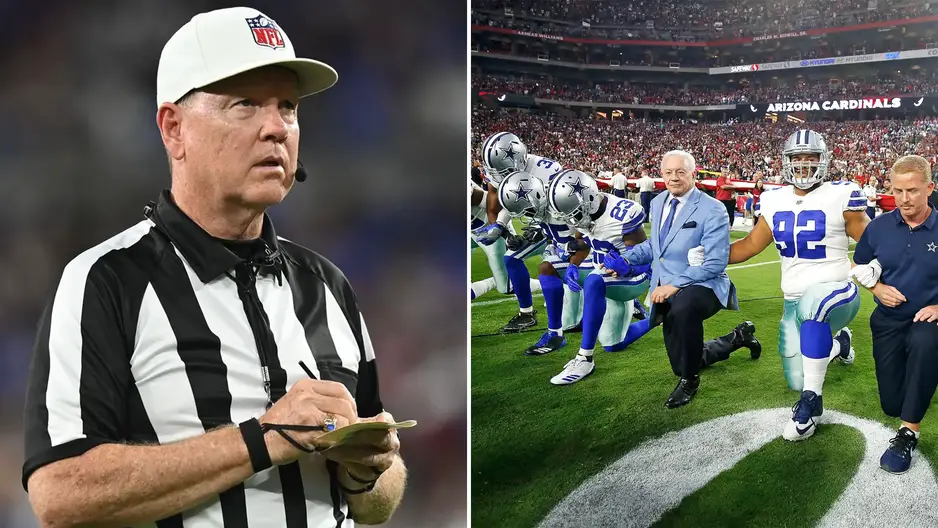
In the ever-evolving intersection of sports and social justice, the NFL has often found itself at the center of heated debates and discussions. The act of kneeling during the national anthem as a form of protest, popularized by former quarterback Colin Kaepernick, continues to be a polarizing issue within the league.
Recently, the NFL referees made headlines when they disqualified ten players for anthem kneeling during a game last week. This incident once again raised questions about the role of athletes in speaking out against social injustices, the league’s policies, and the impact of such protests on the field.
The anthem kneeling protests have become a symbol of dissent against racial inequality and police brutality in the United States. It all began in 2016 when Colin Kaepernick, then a quarterback for the San Francisco 49ers, took a knee during the national anthem as a peaceful protest against these issues. Kaepernick’s silent gesture ignited a nationwide movement, with players from various NFL teams and other sports leagues joining in to show solidarity with the cause.
The protests, however, drew mixed reactions from fans, fellow players, and league officials. Some praised the athletes for using their platform to address important societal issues, while others accused them of disrespecting the flag and the country. This divide has persisted and intensified over the years, with the NFL struggling to find a unified stance.
The NFL has faced challenges in responding to anthem kneeling protests. Initially, the league’s response was to discourage players from protesting by instituting a policy that required them to stand during the national anthem. However, the NFL Players Association objected to this policy and filed a grievance. In response, the NFL decided to suspend the policy in 2018, allowing players to remain in the locker room if they didn’t want to stand during the anthem.
This change in policy reflected the league’s recognition of the need to strike a balance between respecting players’ right to express themselves and maintaining a positive image. It allowed players some autonomy while attempting to defuse a contentious issue.
Despite the league’s efforts to address the issue, the recent disqualifications of ten players for anthem kneeling once again brought the debate to the forefront. The incident occurred during a high-stakes game that drew the attention of millions of viewers. As the national anthem played, ten players from different teams took a knee in protest.
The referees, who have the authority to enforce the league’s policies, promptly disqualified these players. Their decision was met with both support and backlash, reflecting the polarized nature of the anthem kneeling debate. Some believed the referees had done the right thing by enforcing the league’s policy, while others argued that it was a violation of the players’ freedom of expression.
For the ten players who were disqualified, the incident was undoubtedly a moment of frustration and disappointment. Being removed from a game not only affects their personal performance but also influences the outcome of the match. This incident has brought to light the complex position that athletes find themselves in when they choose to protest during games.
NFL players who kneel during the anthem often do so at great personal and professional risk. They are well aware that their actions can lead to consequences such as fines, suspensions, or even being disqualified from a game. However, many feel a moral obligation to use their platform and visibility to draw attention to issues they believe are of paramount importance.
The disqualifications have reignited the discussion about anthem kneeling in the NFL. Public opinion remains divided, with some supporting the referees’ actions and others viewing them as an overreach. The incident has also sparked conversations about the balance between the right to freedom of expression and the rules governing conduct in professional sports.
Advocates argue that the NFL should support players’ right to protest and that the disqualifications send a chilling message, stifling their ability to speak out against racial injustices. Critics, on the other hand, contend that the league must maintain order and discipline during games, and any form of protest during the national anthem is inappropriate.
The NFL’s response to the recent disqualifications has been mixed. While some league officials have defended the referees’ actions as consistent with the league’s existing policy, others have emphasized the need for dialogue and understanding. The incident has prompted the NFL to revisit its stance on anthem protests and consider potential changes to its policy.
Commissioner Roger Goodell acknowledged the need for constructive discussions and collaboration to address the anthem kneeling issue. The NFL Players Association has also been actively involved in negotiations to find common ground and strike a balance between players’ rights and the league’s policies.
The recent disqualifications of ten players for anthem kneeling in the NFL have once again illuminated the complex and highly debated issue of athlete protests during the national anthem. The incident has shown that the anthem kneeling movement is far from settled and continues to be a source of division and discussion.
As the NFL grapples with the evolving landscape of player activism and social justice, it faces the challenge of finding a balanced and fair approach that respects players’ right to express their concerns while maintaining the integrity and discipline of the game. The incident underscores the importance of continued dialogue and cooperation between players, league officials, and the broader public to address this contentious issue in a way that upholds the principles of freedom of expression and unity in sports.
News
Breaking: Angel Reese Thrown Out of the US Team, Fined $10 Million for Criticizing Caitlin Clark
In a dramatic and controversial move, Angel Reese has been expelled from the U.S. women’s basketball team and fined $10 million following her public criticism of teammate Caitlin Clark. The decision has sent shockwaves through the sports community, sparking heated…
JENNIFER GARNER’S HEARTWARMING GESTURE: A TOUCHING ENCOUNTER WITH A HOMELESS MAN LEAVES PEOPLE IN TEARS
Just when it seemed that Jennifer Garner couldn’t possibly endear herself more to fans worldwide, the beloved actress has once again demonstrated an extraordinary gesture of compassion that tugs at the heartstrings. According to reports, the 51-year-old actress was at…
Taylor Swift Surprises Dublin Crowd With Debut Of New Song In Set
Taylor Swift Surprises Dublin Crowd With Debut Of New Song In Set Taylor Swift at Aviva Stadium in Dublin, Ireland. Charles McQuillan/TAS24/Getty Taylor Swift gave a small gift to Eras Tour fans in Dublin, Ireland on Saturday night. For the first time, Swift performed “The Albatross”…
Ben Affleck has ‘come to his senses’ about ‘fever dream’ Jennifer Lopez marriage amid swirling split rumors – one year after couple dropped $60M on mega mansion
Even though they looked cordial at his child’s performance last week and happy in a car together on Sunday, PageSix has claimed Ben, 51, is over the union and is ready to divorce. A source told the site that the Oscar-winning Argo…
Jennifer Lopez and Ben Affleck Headed for Divorce in Part Because of Her ‘Love Addiction’
RELATIONSHIP CRUMBLED IN PART BECAUSE SHE’S A ‘LOVE ADDICT’ Jennifer Lopez and Ben Affleck are clearly headed for divorce, and some of the folks we’ve spoken with say one of the many reasons for the split — JLo’s “Love Addiction.”TMZ has a new…
Jennifer Lopez hits back after fan claims she uses Botox
Jennifer Lopez has hit back after a fan claimed she uses Botox to look as good as she does at 51. The singer took to Instagram to share a video of herself and her amazingly glowing skin after applying a facial…
End of content
No more pages to load




